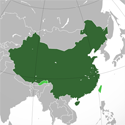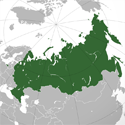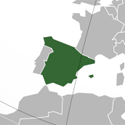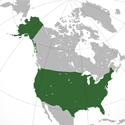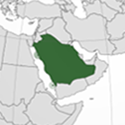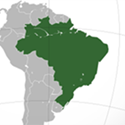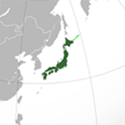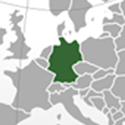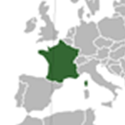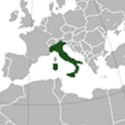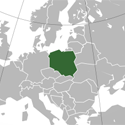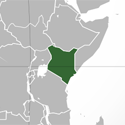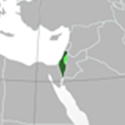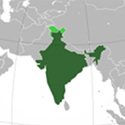Немно́го о языке́ 3.6 Стра́ны и языки́
Talking About Languages
Click on the images below to see the countries and languages spoken within them. You can click on multiple images and move them around the screen or click on one and use the left and right arrow keys to view them like a slide show.
By not expressing the subject они́ and just using the third-person plural verb form, the Russian sentence takes the focus off the "doer" of the action. The focus of the sentence becomes, instead, the fact that the action is done, that the action happens. To express the equivalent notion in English, we can use the empty subject "one" (i.e., One speaks Russian here.) or we can use the passive voice (i.e., Russian is spoken here). Another way to express this in English is with the subject "people" as well -- but without an exact reference to particular individuals: people generally.
This kind of sentence, one that uses a third person plural verb without an expressed они́ subject pronoun, is quite common in Russian. You have already encountered this sentence type in the phrases for asking about names and telling someone’s name.
- Как вас зову́т? = What is your name?
- Меня́ зову́т Ама́нда. = My name is Amanda.
The form зову́т is the third person plural of the verb stem зов-, meaning "call." So the phrase "What is your name?" is literally "How do [they] call you?" and "My name is Amanda" is literally "[They] call me Amanda."
So in these sentences the subject is not expressed, either as a pronoun or a noun. Those of you who have studied French, be aware that your inclination to try to use the French word 'on' (one) for these sentences will not work in Russian; the Russian он can only mean a specific person or masculine object, never "one" or "people generally." We will draw your attention to further examples of the subjectless sentence type as we encounter more of them in our story.
More About Languages: по-ру́сски versus ру́сский язы́к
In the first section of Unit 3, we noted that in addition to learning a verb's conjugation, one also needs to learn how to express the particular kind and form of the complement that can follow a verb. While the phrases по-ру́сски and ру́сский язы́к can both be translated into English as "Russian" (meaning the language), they may NOT be used interchangeably.
The form по-ру́сски is an adverb (something like saying "Russian-ly"), and it can be the complement of verbs that specify language abilities or skills, such as говор- (speak), читай- (read), пиш- (write), and понимай- (understand).
The ру́сский язы́к form is an adjective-noun phrase, and it is the complement of verbs like знай- (know), изучай- (study), and люб- (like, love).
Use good learning strategies!
If you find you are having difficulty with this concept, or find yourself confusing the по-ру́сски / ру́сский язы́к forms a lot, here are some additional strategies:
–It may help you to notice carefully how whole phrases that contain these verbs look and sound, read and listen to them as much as you can until they "feel right."
–Work on learning carefully whole phrases that are meaningful to you – for example, remembering what you know about Tony and Oleg, or Amanda, or any of the students in our story – rather than just memorizing the rules.
–You may find it helpful to make a list of your own abilities in different languages and have your teacher help make sure it is correct.
Compare the forms in these tables:
| Я говорю́ Я чита́ю Я понима́ю Я пишу́ |
|---|
| по-кита́йски. |
| по-ру́сски. |
| по-испа́нски. |
| по-англи́йски. |
| по-ара́бски. |
| по-португа́льски. |
| по-япо́нски. |
| по-неме́цки. |
| по-коре́йски. |
| по-францу́зски. |
| по-италья́нски. |
| Я зна́ю Я люблю́ Я изуча́ю |
|---|
| кита́йский язы́к. |
| ру́сский язы́к. |
| испа́нский язы́к. |
| англи́йский язы́к. |
| ара́бский язы́к. |
| португа́льский язы́к. |
| япо́нский язы́к. |
| неме́цкий язы́к. |
| коре́йский язы́к. |
| францу́зский язы́к. |
| италья́нский язы́к. |
Упражне́ние 1
Choose the word that will correctly complete each sentence below. Pay close attention to the phrase that names the language, since that will help you select the correct verb.
Using Infinitives
Infinitives have a number of uses in Russian. They can be used as a complement with a conjugated verb like люби́ть (to like, to love to do something).
Ама́нда лю́бит чита́ть газе́ты, а То́ни лю́бит смотре́ть баскетбо́л.
Infinitives can also follow an adverb, as in the sentence:
Тру́дно говори́ть по-ру́сски.
You will learn more about how to use adverbs in the next section.
Adverbs
In English grammar one is taught that adverbs "tell you how" something is done. Russian too has different forms for adverbs and adjectives; the adverb will end in a single vowel, most often -о – so it looks a bit like a "shortened" adjective.
In this section we will work on two ways that Russian uses adverb forms.
The first is in sentences where the adverb is followed by an infinitive.
Read the examples below:
Тру́дно изуча́ть ру́сский язы́к. (it is hard to …)
Но поле́зно знать ру́сский язы́к. (it is useful to…)
Легко́ чита́ть по-англи́йски. (it is easy to…)
Интере́сно смотре́ть ру́сские фи́льмы… (it is interesting to …)
Хорошо́ гуля́ть в па́рке… (it is good to …)
Listen to the pairs of opposites and practice saying them.
| легко́ | тру́дно |
| хорошо́ | пло́хо |
| интере́сно | неинтере́сно |
| отли́чно | ужас́но |
| поле́зно |
Differences in pronunciation between adverb forms and adjective forms:
Note that for the phrase "it is easy" you will need to devoice the г in легко́ to a х, just as you did with the adjective. In addition, because the stress is on the -о, the first vowel is "reduced" to sound like [и]: [лих-ко́]. Note too that the ё in лёгкий is spelled as е in the adverb. Compare the pronunciation of the two forms below:
Матема́тика – лёгкий предме́т.
The adverbs for both "it is good" and "it is bad" shift stress to a different syllable from the adjective form:
Notice that in the "it is easy to…" type of sentence, we do not need to worry about the word "it" it is already automatically "built in" to the construction "adverb + infinitive" and does not need to be translated.
Упражне́ние 2
You will hear several students talk about things they like and don't like, and why. After each student speaks you will see a list of some opinions. Based on what you have heard, choose each opinion that the student has expressed.
Упражне́ние 3
The second way we use adverb forms in Russian is to describe "how" – using words that indicate how well or badly you do something.
So far you have encountered many adverbs that describe how well one does something. Match the adverbs below with their basic English equivalents.
Noticing
| Look at the adverbs in the table above. What vowel do most of these adverbs end in? | |
| а | у |
| о | е |
| ю | |
While these basic English equivalents can help you start to remember the words’ meaning, the best equivalent for an adverb will depend on the sentence level context. Совсе́м не .. literally means "completely not," but as it is used in sentences like “Он совсе́м не понима́ет по-ру́сски», the best translation is really "not at all" – "He doesn’t understand Russian at all."
The difference between ма́ло and немно́го is one of perspectives: ма́ло is the pessimist’s view—it means “little” when little is not enough; немно́го is the optimist’s view – it means “a little” when that “little” is just enough.
Adverbs generally are put right before the verb in Russian in neutral factual statements. Avoid putting adverbs after the verb unless you mean to place very strong emphasis on them.
Ама́нда ду́мает, что она ма́ло рабо́тает.
Но все зна́ют, что Ама́нда рабо́тает мно́го.

